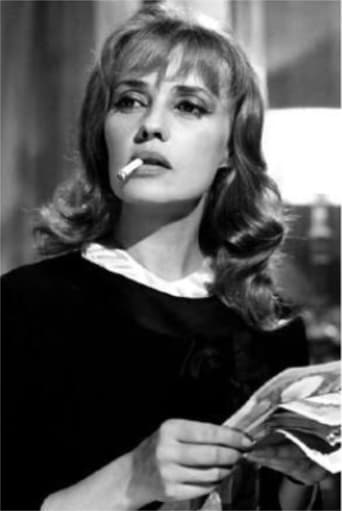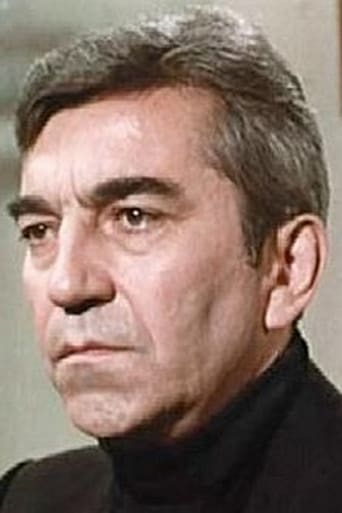Incannerax
What a waste of my time!!!
Softwing
Most undeservingly overhyped movie of all time??
Huievest
Instead, you get a movie that's enjoyable enough, but leaves you feeling like it could have been much, much more.
Guillelmina
The film's masterful storytelling did its job. The message was clear. No need to overdo.
ElMaruecan82
God, what a downer! There's not a single character in Luis Bunuel' "Diary of a Chambermaid" that exudes sympathy. Except for the titular chambermaid herself, Célestine, played by Jeanne Moreau but she's sympathetic by default as the anchor on which revolves most of the other characters' depraved and decadent behavior. She's the newly hired chambermaid from Paris and working for a rich aristocratic family, the Monteils, she's the unlikely revealer of the mentalities that poisoned France in the mid-30's and that only waited for a catalysis to burst out, the worst way, foreshadowing the worst that was still to happen in the next decade.The gallery of characters who occupy the film is depressing indeed, the wife, Madame Monteil, is a dry, childless and frigid woman who's not keen on sex because of pelvic pain, her husband played by Michel Piccoli is a frustrated man who can only satisfy his sexual urges on any woman that comes at range. Rumor has it that he impregnated the previous maid and he seems eager to replicate the experience with Célestine, maybe not with the same consequence. The rest of the staff includes the groom Joseph (powerful performance from Georges Géret) a brute that keeps on blabbering about foreigners and goes on anti-Semitic rants reflecting the mentalities of the time.There's also a neighbor who's a veteran from the Great War and keeps childishly throwing stones on their fences, his plump wife and to complete the obscene portrait, Monsieur's Monteil's elderly father (Jacques Ozenne) who grows a strange fetishist attraction toward Célestine, asking her to read racy novels every night, occasionally try some shoes from his collection and let him caress her ankle. I said Célestine wasn't sympathetic, but only in the sense that she reacts to all the sexual oppression and exploits in order to survive in what seems to be a rotten society. After all, even the good persons can't all be innocent.Celestine is the straight woman, not of a tragicomedy, but of a disillusioned and bitter depiction of the bourgeois upper class at the dawn of World War II, when fascism was raising its ugly head all over Europe. Bunuel faced fascism when censorship prevented his second movie "L'Age d'Or" to be shown in theaters, so you can tell there's a record to settle in his "Diary", the tone is far from his usual surrealistic tropes, and there's not even a moment left for comic relief or far-fetched twists. Bad things happen and it's up to Celestine to turn them to her advantage, to make her weakness an asset, in a way, she reminds me of that great quote from Dolores Clairbone: "Sometimes, being a bitch is all a woman's got to hold in to".But what if you're not a woman? The tone gets even darker when the one innocent character, a little girl to which Celestine grew a rapid fondness, is brutally raped and murdered by Joseph. The scene starts as a representation of "little red riding hood" and when Joseph warns her about the wolf, he snaps and he realizes that he'd make a good predator after all. The murder of the girl derails Celestine's plans, she was just about to live the mansion but decides to stay to confront the rapist she clearly identified. Yet the film is less about heroism but about a really ugly time. It might also feel like the downfall of the bourgeois society but the most ruthless and despicable man is a working man. There was something rotten to the core and that's how the whole experience feels, shocking and displeasing. Bunuel beautifully conveyed that feeling."Diary of a Chambermaid" is perhaps a less colorful version of the same world Renoir showed in "The Rules of the Game", as there's no game in the film, unless you mean the game of hypocrisy, frivolity disguised under respectability and unhappiness, the only person who might end up happy after all is the veteran who married Célestine, he was old, she was young and plain, together they deserve each other. The ending is anti-romantic but shows that there was a zone of turbulence history had to get through and that culminated at a time where people started to practice, the end doesn't even feature Célestine but a march of fascists lead by Joseph and shouting "Vive Chiappe" (the man who censored "L'Age d'Or"). It's very telling when the only guy who "walks the walk" in the film is the most despicable.Maybe Renoir's tone was more playful because, unlike Bunuel, he made the film before the War. Bunuel knew where this was leading to and maybe the little girl was an allegory of little Marianne, as a France, still young, and ready to be murdered. The film, written by Jean-Claude Carrère, marks an interesting reminder of the darkest hours of France. Jeanne Moreau just died and I saw the film a second time on a special TV tribute, the film made me realize how fresh and lively she looks, despite being 36 at the time of the film, she exudes a mix of pseudo innocence and a blasé attitude that is genuinely irresistible, she's not glamorous but she raises her appeal beyond the usual archetypes, and it works in the film.Still, it's a rather displeasing story whose title doesn't prepare you for how actually dark it is.
evening1
This somewhat aimless film points rather distractedly at many things people do, both good and bad. I am struggling to pull it together for a better sense of what it means, but I am at a loss.Jeanne Moreau plays Celestine, a sensitive and intelligent 32-year- old from Paris who inexplicably goes to the provinces to serve as chambermaid in the country estate of the Monteil family.A sense of foreboding builds as we notice peculiarities in the home. Mme. Monteil's father is a courtly gentleman with a serious shoe fetish. Her husband sustained a brain injury during the war and she rejects him sexually -- so he importunes all of the female help. Worse, we notice that Georges, a sadistic handyman on the estate, is impulsive and cruel toward young Claire, a neglected niece of Mme. Monteil.A terrible crime occurs and Celestine will stop at nothing to see that Georges is hauled off to jail. Later, she marries the childish, anti-Semitic war veteran next door and we are left with an uncomfortable feeling that she is unhappily suspended in time just prior to the establishment of Vichy France.It's an interesting performance by Moreau, but the story evanesces toward the end.A compelling but uncomfortable viewing experience.
JasparLamarCrabb
Luis Buñuel's stunning film stars Jeanne Moreau & Georges Géret in a clever battle of wills. Moreau is the new chambermaid of an estate lorded over by a kinky aristocrat (with a shoe fetish) and his remarkably uptight (and very materialistic) daughter, played to the hilt by Françoise Lugagne. The daughter's husband (Michel Piccoli) is a wannabe Casanova who's impregnated some of the past help. Added to the mix is political radical Géret, who may or may not be a child killer. Buñuel really peels back a rotten onion here, with the sexy and free-spirited Moreau slowly realizing that she's in a madhouse. The director has seldom been so straightforward in his indictments. Here he takes aim at the bourgeoisie, the French government, and of course religion (one of the townspeople is quick to finger a couple of monks as murder suspects). It's a scathing film but also filled with many comic touches: Moreau's show of boredom at her at employer's fetish; the constant battle between Piccoli and blustery neighbor Daniel Ivernel; Lugagne's hen pecking nagging of Moreau NOT to break anything. It's superbly acted by all, with Moreau giving what is really an Oscar worthy performance. In addition to the great work by Laugagne, Géret is perfect as the radical/bully and Piccoli adds a lot playing against type as a real nitwit. The film's co-writer Jean-Claude Carrière plays a befuddled priest.
Chris_Docker
Buñuel once said, "Bourgeois morality is for me immoral and to be fought. The morality founded on our most unjust social institutions, like religion, patriotism, the family, culture: briefly, what are called 'the pillars of society'."I mention this, not to alienate people who might find such a statement offensive, but to suggest insight into his point of view. A viewpoint vigorously defended in this anti-bourgeois, rural tale that has a kick like a mule. Buñuel's truths are just as applicable today but, by putting them in 1930s France, he sweetens the bitter pill with a coating of sex, storytelling and the reassuring fiction that 'things have maybe moved on since then.'Célestine impresses us. Intelligent, attractive and sophisticated - but she nevertheless needs to earn her living in service. She takes the train from Paris to work as a chambermaid at a country estate. In this lap of wealth, she deals with a panoply of dodgy people. A brutish handyman. A frigidly overbearing Madame Monteil. Madame's lecherous husband and her kinky father. Remarkably, none of these are portrayed as stereotypes. Characters are well fleshed out as Buñuel pits one against another. Madame Monteil earns our sympathy as she confides sexual shortcomings to the priest, who is in turn well-meaning if hopelessly out of touch. Doddering old Monsieur Rabour, although at first shockingly abhorrent with his fixation on women's feet, probably has nothing more harmful than a shoe fetish. "Would you mind if I touch your calf?" he asks (but goes no further up her leg). Is Célestine playing a dangerous game? Is she a libertine? Or just one step ahead of her audience?The first half of Diary of a Chambermaid is delightful saucy comedy. Buñuel's famed surrealism, that make films like Un Chien Andalou or L'Âge d'Or so formidable, is nowhere to be seen. Nor do we have to grapple with the distanciation of Exterminating Angel, his Brechtian masterpiece of just two years earlier. But be warned, gentle reader. The second half is not only grislier, but by the end Buñuel will have pulled the rug from under your feet. It can be a bleak experience.Quite apart from a clever story, Diary of a Chambermaid offers many delights, both to casual viewers and serious film analysts. Depending on your viewpoint, Moreau's many-sided performance is either a triumph for feminism or stands feminism on its head. It strips bare the bourgeoisie and capitalist, presenting the rising tide of French fascism as xenophobic intolerance - one we can recognise as replicated in many countries or patriotic cults even today. The hypocrisy of the upper classes is one of 'fur coat and no knickers'; whereas the pious protestations of the lower ranks are shown as the facade from which they lust after the coat itself.Class-struggle is mirrored by sex-as-power. To men, sex becomes a celebration of might, whether physical, social or financial. To women, it is the potential to entrap with allure. She is always present and always unattainable. Through this implied promise of sexual gratification she bends men to her will. And still projects an aura of 'purity'. Our handyman tortures a goose before killing it – rather horrible, but in a way does it add to his raw animal charm? And is Buñuel really just telling a story? Or is he manipulating his audience to drive the point home?This is also Buñuel's only film made in anamorphic widescreen format. Although not showy, the cinematography is powerful. Credits open to the sound of a rushing steam train. We watch, through Célestine's eyes, the countryside flash by. A wide angle lens increases the sense of movement, as if we are propelled by an unstoppable force.When Joseph tries to kiss Célestine at night by the bonfire, his posture is that of a vampire. A snail crawling across the a dead and violated body in the woods is as vivid and shocking as anything from Buñuel's earlier catalogue of slit eyeballs and dead donkeys. But it is Buñuel's acerbic vision of all that is wrong, in all layers of society, that is so chilling.At one point, Monsieur Rabour is reading the French author JK Huysmans. Huysman's view of the world was as pessimistic as Buñuel, but it is Buñuel that makes it so all-encompassing. The festering fascist mob who cheer for Chiappe in our film, are honouring the same chief of police who prohibited Buñuel's L'Âge d'Or (after fascists destroyed the cinema where it was being shown). There were few governments that liked Buñuel, and we can see that the feeling was mutual.The film is more political than it is entertaining, which may alienate some viewers who start off liking it. Even the title seems cynical – I don't recall any suggestion of her keeping a journal. Diary of a Chambermaid is a great vehicle for Moreau, who gets to play so many characters in one. A criticism often levelled at mainstream cinema is that women tend to be decoration in male-driven plots. Célestine (or 'Marie' as she is called in another dig at Catholic - or class - depersonalisation) doesn't so much take over the driving seat as suggest a new perspective from which she is in control. Audiences will divide on whether they ultimately like her or not.Things may have moved on. Domestic service is less harsh in most parts of the world where it survives today. Fascism has been replaced with virulent if not yet such obvious forms of rampant and aggressive nationalism. Sex is not always a game of power. But forces of immorality still pose in white robes and high office. 'Commoners' still aspire to the evils they decry. The purity of a saint is maybe needed to 'enjoy' Diary of a Chambermaid. But Buñuel stood up for his beliefs. Today, most viewers may content themselves with standing up for his cinematic skills.





